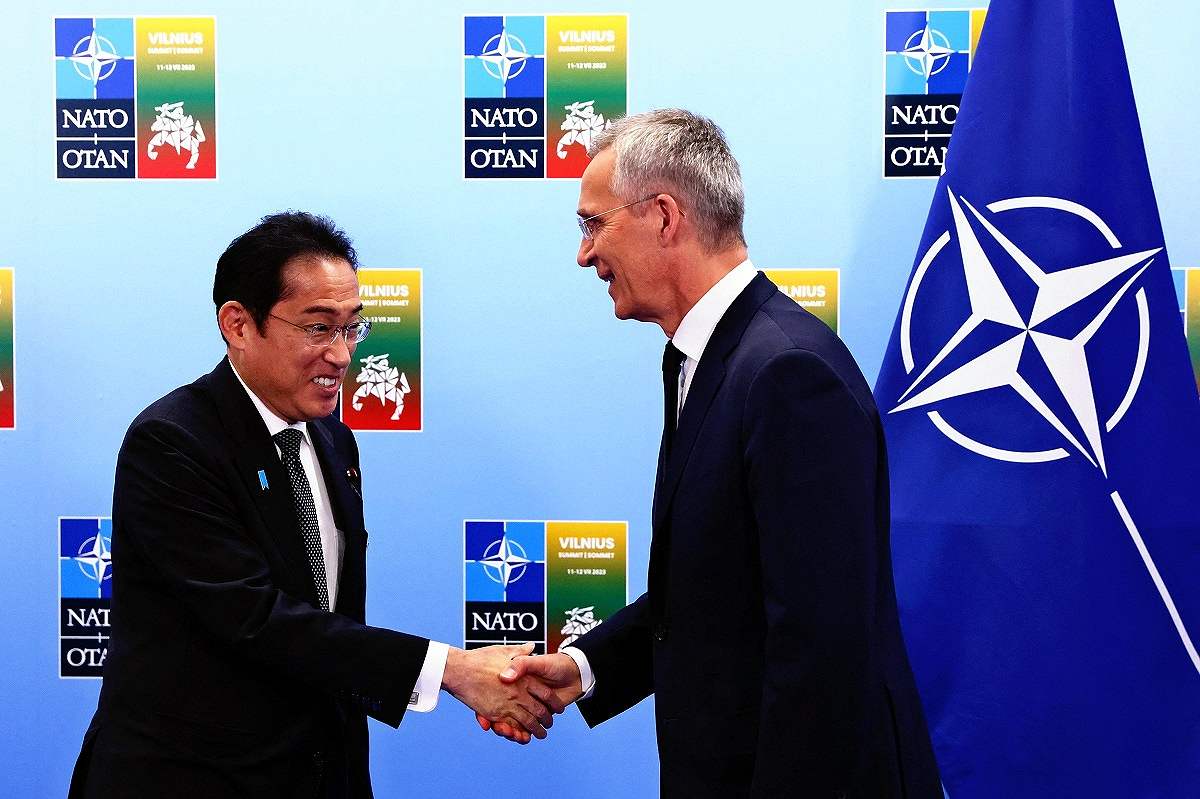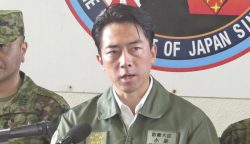
Prime Minister Fumio Kishida, left, shakes hands with NATO Secretary General Jens Stoltenberg in the Lithuanian capital of Vilnius on Wednesday.
16:50 JST, July 13, 2023
VILNIUS — The Japanese government has signed a new partnership document with the North Atlantic Treaty Organization to enhance security coordination with Europe, with China’s increasingly hegemonic moves in mind.
Japan aims to bolster its defense capabilities to keep China in check by promoting cooperation in such fields as cyber defense and measures against disinformation through the agreement with NATO, called the Individually Tailored Partnership Program, or ITPP.
Prime Minister Fumio Kishida attended a joint media conference with NATO Secretary General Jens Stoltenberg in the Lithuanian capital of Vilnius on Wednesday.
“Japan and NATO will not tolerate any unilateral attempts to change the status quo by force. As partners that share strategic interests, we will deepen our ties,” Kishida said at the beginning of the media conference.
He went on to say, “We would like to promote cooperation in new fields, such as responses to cyber-attacks defense and information manipulation.”
Stoltenberg specifically named China, apparently keeping in step with Kishida, and expressed concern about China’s military build-up, including the modernization and expansion of its nuclear forces.
NATO has concluded similar documents with Australia and other countries to deepen cooperation. The new document signed with Japan covers a period from 2023 to 2026.
Areas of focus were expanded from the previous nine to 16, such as cyber defense; strategic communication, including practices on countering disinformation; emerging and disruptive technologies, such as artificial intelligence and quantum technologies; and space security.
Japan will have more opportunities to send observers to training programs hosted by NATO, in line with the goal of boosting its counter-capabilities.
The U.S. government has pointed out China’s involvement in cyber-attacks for the purpose of stealing confidential information. Also, in connection with the planned discharge of treated water from the Fukushima No. 1 nuclear power plant, the Chinese government is trying to shake the Japanese government, distributing information that has no scientific basis.
China is also increasingly making active moves to utilize state-of-the-art technology in its military operations, such as development of AI-equipped drones.
A senior official of Japan’s Foreign Ministry expressed a sense of crisis, saying, “It will be necessary to share the recognition that the security of Europe and the Indo-Pacific are inseparable and get Europe to become involved in the ‘encirclement of China.’”
Yet, NATO is not monolithic. French President Emmanuel Macron said that Europe must not be a “follower” of the United States with respect to China’s growing military pressure on Taiwan. The president also showed objections to opening a NATO liaison office in Tokyo, a plan under negotiation between Japan and NATO. The plan is likely to be shelved for the time being.
Kishida is expected to display his diplomatic skills, persistently seeking understanding from European countries about the increasingly severe security environment in Asia and making efforts to solidify partnerships with them.
Top Articles in Politics
-

Japan PM Takaichi’s Cabinet Resigns en Masse
-

Sanae Takaichi Elected 105th Prime Minister of Japan; Keeps All Cabinet Appointees from Previous Term
-

Japan’s Govt to Submit Road Map for Growth Strategy in March, PM Takaichi to Announce in Upcoming Policy Speech
-

LDP Wins Historic Landslide Victory
-

LDP Wins Landslide Victory, Secures Single-party Majority; Ruling Coalition with JIP Poised to Secure Over 300 seats (UPDATE 1)
JN ACCESS RANKING
-

Japan PM Takaichi’s Cabinet Resigns en Masse
-

Japan Institute to Use Domestic Commercial Optical Lattice Clock to Set Japan Standard Time
-

Israeli Ambassador to Japan Speaks about Japan’s Role in the Reconstruction of Gaza
-

Man Infected with Measles Reportedly Dined at Restaurant in Tokyo Station
-

Man Infected with Measles May Have Come in Contact with Many People in Tokyo, Went to Store, Restaurant Around When Symptoms Emerged





















